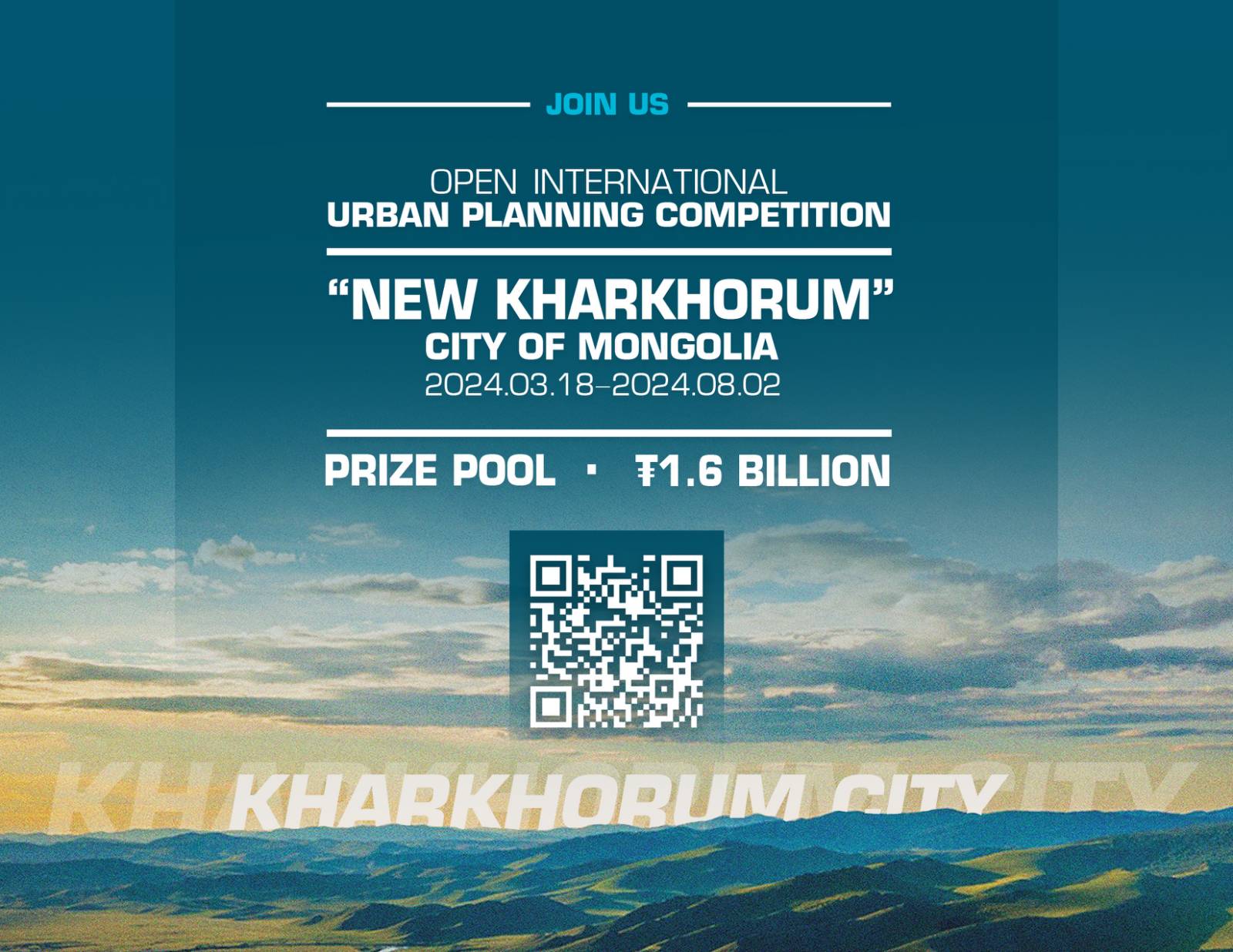- 19 March 2024
- 297 defa okundu.
The “New Kharkhorum City” of Mongolia International Competition
Applications for The "New Kharkhorum City" of Mongolia International Competition can be made until 16 July 2024.

Introduction
The Orkhon Valley represents a significant historical birthplace of ancient states in the Mongol Empire. It encompasses the city of Luut, the Mumo city of the Rouran Khaganate, the ruins of Uyghur’s Kharbalgas, the sacred tombs of Turkic kings and ancestors, and the Kharkhorum city of the Mongol Empire. It is regarded as the “cradle” of Mongolian culture and history, encompassing Mongolia’s civilization and historical heritage. In the year of the white dragon, or the 15th year of Chinggis Khan’s (Genghis Khan) reign, in 1220, he declared the city of “Kharkhorum” the capital of the Mongol Empire, the sacred heart of Mongolian people. He ordered its construction in the vast valley of the Orkhon River. The ancient capital of Kharkhorum was a valuable historical, political, economic, and cultural heritage center where talented scholars, artists, artisans, merchants, and ambassadors of kings and nobles from various countries settled and visited.
Despite occupying only 0.3% of Mongolia’s total land area, Ulaanbaatar accommodates roughly 50% of the population, and its growth is expected to continue. Due to the accumulation of social, economic, and population over-concentration issues, the level of disaster risk is increasing, necessitating the need for a new city to be built.
Statement
The Mongolian President, the National Assembly, and the Government of Mongolia have mandated the establishment of the “New Kharkhorum” city in the Orkhon Valley. Some reasons for creating a new city include overcrowding and pollution in the current capital city, Ulaanbaatar, and the desire to decentralize government and economic activity. However, building a new capital city is a complex and multi-faceted undertaking that involves many considerations. Some essential aspects to consider might include location, infrastructure, environmental impact, cost, and the population’s needs and preferences.
If Mongolia were to build a new capital city successfully, it could benefit the country in several ways. For example, it could provide opportunities for economic growth and development, improve living conditions for residents, and help reduce pollution and congestion in the current capital city.
Objective
Establishing the principles of urban planning, top priorities, and a clear vision of New Kharkhorum City is imperative. These elements must be meticulously delineated, taking into account their interdependence and the potential for long-term success. By doing so, the city can cultivate a sustainable and thriving community that will endure for years.
Timeline
Registration starts: March 18, 2024
Registration closes: 11:59 on April 15, 2024
Concept processing period: April 15, 2024 – July 16, 2024
Selection period for the jury committee: April 22, 2024 – May 21, 2024
Submission deadline: at 11:59 on July 16, 2024
Evaluation phase 1 (General assessment) schedule: at 11:59 on July 19, 2024
Exhibition period: from 10:00 on July 25, 2024, to 18:00 on July 31, 2024
Public evaluation period: from 10:00 on July 25, 2024, to 18:00 on July 31, 2024
Presentation of the project: July 30, 2024 – July 31, 2024
Evaluation phase 2 (Public evaluation): July 31, 2024
Evaluation phase 3 (Evaluation of jury committee): August 1, 2024
Announcement and Awards: August 2, 2024
*The schedule displayed is calculated using the UTC+8 time zone, which corresponds to the time zone of Ulaanbaatar, Mongolia.
Participation Range and Type
The official languages are Mongolian and English.
Open to international and domestic organizations, teams, and individuals.
For this project, every participant is required to create a team comprising a minimum of 9 members belonging to the following professional domains:
– Urban Planning
– Architecture
– Civil Engineering
– Landscape Architecture
– Urban Economics
– Infrastructure Engineering
– Additional experts can be added as per the project’s requirements.
Open to both foreign and domestic design professionals. Collaborating with professionals from diverse backgrounds and skill sets can help improve skills and produce innovative solutions for the New Kharkhorum City project.
Organizations and individuals cannot participate on multiple teams.
It is possible to modify the co-participant list until the end of the registration period.
Jury Committee
Juries will have 15 attendees, including 13 from Mongolia and two international.
Six members of the committee will be recruited through the selection process.
Selection Process
The selection process will consist of three phases. Only those participants who successfully complete the initial phase will be deemed eligible to proceed to the subsequent phase. The top five participants will be selected with the highest scores achieved throughout all three phases combined.
Evaluation phase 1 (Preliminary selection, general assessment)
– The Urban Planning Administration of “New Kharkhorum” City of Mongolia will evaluate the participants’ general qualifications and competence.
Evaluation phase 2 /Public evaluation/
– Evaluating projects using an electronic network is a commendable initiative that engages the public in decision-making. After the first phase, citizens’ feedback will be collected.
– An exhibition will be displayed for public evaluation
Evaluation phase 3 /Evaluation of jury committee/
– The teams who have completed phase 1 will have the prospect of presenting their projects in person to the competition juries, comprising 1-2 representatives of each team. It is further commendable that participants who cannot attend in person may present online. For those who are presenting online, the duration of the presentation must not exceed 30 minutes.
– The jury committee will evaluate the projects.
Prize Packages
Total prize pool: 1,600,000,000.00 /One billion and six hundred thousand MNT/
1st place MNT 750,000,000.00 /Seven hundred and fifty million/
2nd place MNT 400,000,000.00 /Four hundred million/
3rd place MNT 200,000,000.00 /Two hundred million/
4th place MNT 150,000,000.00 /One hundred and fifty million/
5th place MNT 100,000,000.00 /One hundred million/
(There will be a tax withholding of 10%; other taxes are the responsibility of the participants)
Three nights’ stay for 1-2 people at a major hotel in Ulaanbaatar will be accommodated by the organizer, and participants will be responsible for other expenses.

